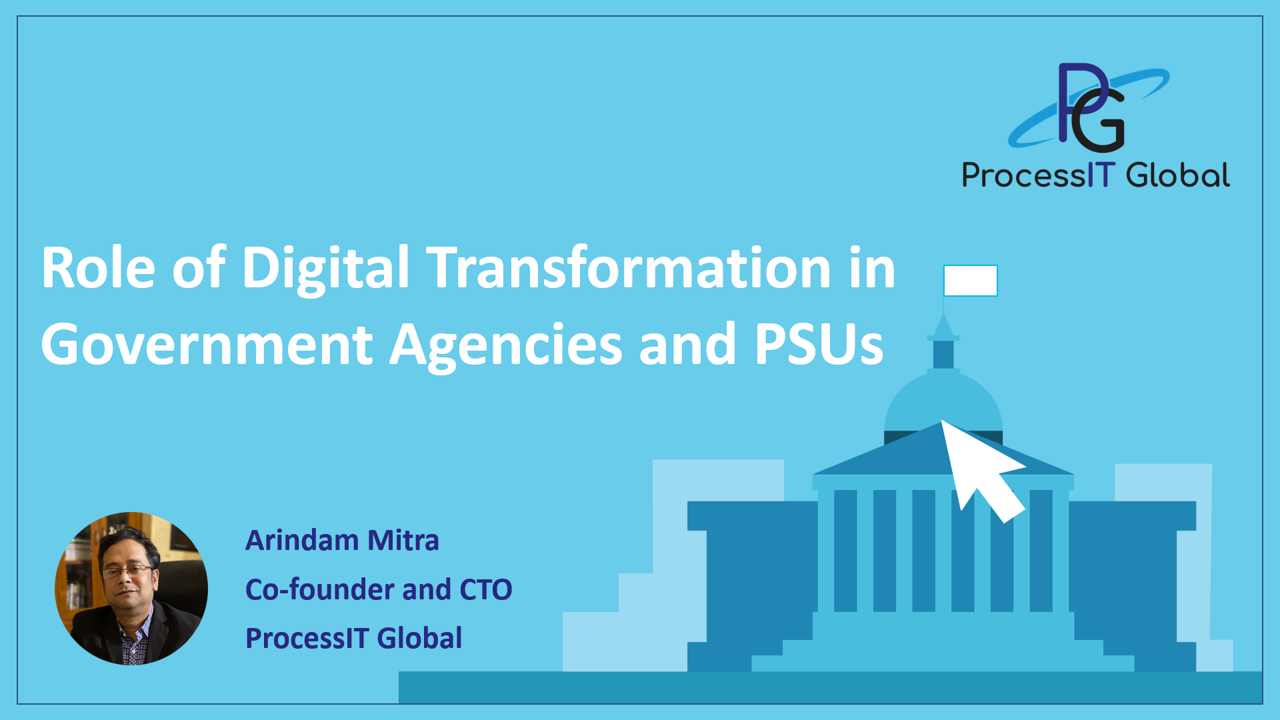Role of Digital Transformation in Government Agencies and PSUs - Arindam Mitra, Co-founder and CTO, ProcessIT Global

Digital Transformation initiatives are seen in both private sectors and Government Agencies and the Public Sector Undertakings. Yes, though to a lesser extent, digital technologies are now being accepted in the Government sector too! The sector is now realising the need to reinvent the way services are delivered to citizens and digital transformation is disrupting PSUs. New age technologies are supporting to build innovation capabilities in addition to bringing about better economic and social outcomes for citizens. Digital Transformation is not about putting together a set of new technologies but it needs to be worked at strategically before implementation. The organizational restructuring is imperative with respect to governance and culture. Better understanding of citizens, their grievances and expectations The citizens of today demand public services to function like the private ones they are already used to. They want government services to get personalized with quick response time. To build public trust, government agencies have to be transparent, deliver high quality service with effective two-way communication system in place. They can leverage advanced data analytics to understand citizen’s journey, and other data gathered from devices for providing personalised services. Eg. Chatbots are already leveraging AI to answer queries of citizens on government websites and can be used for urban planning in the future. Developing new solutions to infrastructure and other challenges Today, pollution, shortage of water and energy resources, urbanization and public safety are constantly throwing challenges to governments. Urban infrastructures need to be upgraded to house smart technologies. Digital technologies inclusion can help develop smart devices for efficient monitoring, usage and control of energy and water resources. Sensors and software solutions can support physical assets and efficiently drive them to solve people’s problems. Digital savvy leadership team a must for effective transformation Today’s fast evolving environment presents several challenges that are required to be addressed in a timely manner, quickly. Decisions have to be swiftly taken by government leaders to efficiently handle every crisis or in building a new strategy. Without digital analytics and associated technologies, this will become almost impossible for governments to bring in suitable solutions. When the digital agenda is brought in from top leadership team, employees are more likely to follow. They are also more willing to get trained and re-skilled to develop digital skills. This will enable PSUs and government bodies to realise their digital strategy quickly. With Digital Transformation, collaboration between teams and departments will be very high, driving innovation, thus making the government sector future-ready. In the case of having visibility into the spending by the finance ministry and tracking the route of the money, from the ministry to government department and its delivery, blockchain technology can be used. Predictive analytics can be used to manage public resources and take preventive action if necessary. However, there are several challenges that have to be addressed before government goes digital. Priorities have to be set right as most of the time other priorities will eat into the digital transformation budget and the latter will take a back seat. Many in traditional government organizational setup, lack the necessary digital skillsets and complete understanding of going digital. Cyber security is another area of concern where sensitive data can be leaked leading to other social and political disturbances. It is critical for the right skilled professionals to handle government Digital Transformation projects to establish a high quality of life of citizens, which will in turn help in gaining public trust. This will also push the country’s ranking on all fronts and improve competitiveness in the global economy. Citizens and service users also should be a part of the digital transformation for its success.



